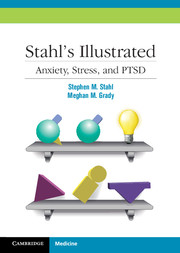Book contents
- Frontmatter
- Preface
- Contents
- Continuing Medical Education (CME) Information
- Objectives
- Chapter 1 Neurobiology of Stress and Anxiety
- Chapter 2 Posttraumatic Stress Disorder (PTSD)
- Chapter 3 Neurotransmitter Systems as Pharmacological Targets for PTSD
- Chapter 4 First-Line Medications for PTSD
- Chapter 5 Second-Line, Adjunct, and Investigational Medications for PTSD
- Chapter 6 Cognitive Behavioral Therapy (CBT) for PTSD
- Chapter 7 Caring for Patients with PTSD
- Chapter 8 Unique Considerations for the Military Population
- Summary
- Abbreviations
- Suggested Readings
- Index
- CME: Posttest and Certificate
Continuing Medical Education (CME) Information
Published online by Cambridge University Press: 19 October 2021
- Frontmatter
- Preface
- Contents
- Continuing Medical Education (CME) Information
- Objectives
- Chapter 1 Neurobiology of Stress and Anxiety
- Chapter 2 Posttraumatic Stress Disorder (PTSD)
- Chapter 3 Neurotransmitter Systems as Pharmacological Targets for PTSD
- Chapter 4 First-Line Medications for PTSD
- Chapter 5 Second-Line, Adjunct, and Investigational Medications for PTSD
- Chapter 6 Cognitive Behavioral Therapy (CBT) for PTSD
- Chapter 7 Caring for Patients with PTSD
- Chapter 8 Unique Considerations for the Military Population
- Summary
- Abbreviations
- Suggested Readings
- Index
- CME: Posttest and Certificate
Summary
Overview
This book provides an overview of the latest developments in research and clinical treatment of posttraumatic stress disorder (PTSD). Chapter 1 covers the neurobiology of normal fear and worry and how genetic and environmental factors may interact to affect these circuits and increase risk for psychiatric illnesses such as PTSD. Chapter 2 covers the clinical presentation of PTSD, including comorbidities and suicidality as well as its underlying risk factors and neurobiology. Chapter 3 reviews the major neurotransmitter systems that regulate functioning within anxiety-related brain circuits, and that are therefore potential targets of pharmacologic action in the treatment of PTSD. Chapter 4 reviews the mechanisms of action and clinical characteristics of first-line pharmacologic treatments for PTSD, while chapter 5 does the same for second-line, adjunct, and investigational agents, and chapter 6 explains the methods for several first- and second-line cognitive behavioral therapies. Chapter 7 reviews diagnostic and treatment strategies for patients with PTSD, including consideration of comorbidities. Finally, chapter 8 focuses on risks and complicating factors that are particularly relevant to the military population, with emphasis on the relationship between PTSD and the potential long-term effects of mild TBI.
Target Audience
This activity has been developed for prescribers specializing in psychiatry. There are no prerequisites. All other health care providers interested in psychopharmacology are welcome for advanced study, especially primary care physicians, nurse practitioners, psychologists, and pharmacists.
Statement of Need
A surprisingly high percentage of the population will experience at least one traumatic event in their lifetime (trauma being defined as a frightening situation in which one experiences or witnesses the threat of death or injury). Although not all individuals exposed to traumatic events will develop psychopathology—in fact, most do not—a significant minority will, with potentially devastating consequences for them and their loved ones.
The following unmet needs and professional practice gaps regarding anxiety and posttraumatic stress disorder (PTSD) were revealed following a critical analysis of expert faculty assessment and literature review:
• PTSD is increasingly prevalent and associated with significant morbidity and mortality
• Neurobiology of stress and anxiety can serve to enhance understanding of anxious symptoms and their treatment
• Treatments for PTSD continue to be examined, with many options—both pharmacological and nonpharmacological—available based on individual symptoms
- Type
- Chapter
- Information
- Stahl's Illustrated Anxiety, Stress, and PTSD , pp. vii - xPublisher: Cambridge University PressPrint publication year: 2010



